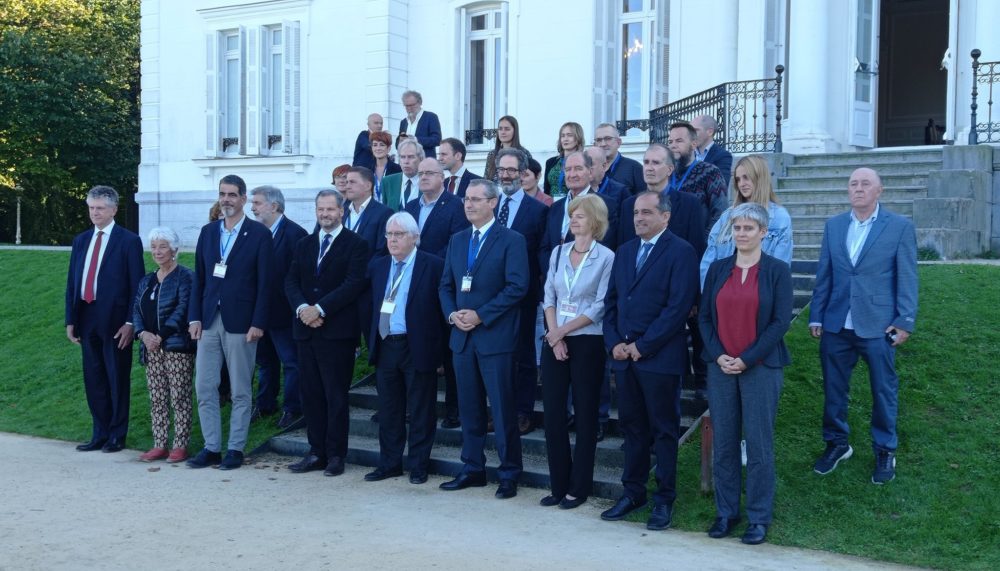FEATURE | 18 Oct 2021
Lessons learnt from the Basque peace process
Ten years after the Aiete peace conference

Berghof looks back at an unconventional peace process that teaches us the value of creativity and persistence in the face of deadlocks.
Ten years ago, on 17 October 2011, the Berghof Foundation accompanied Basque civic and political actors in the organisation of the International Conference for the resolution of the conflict in the Basque Country, known as the Aiete Conference. This conference opened the door to a new scenario for peace in the Basque Country. One decade later, Berghof co-hosted once again a peace conference in the Aiete Palace of San Sebastian to take stock on a decade of peacebuilding efforts in the Basque Country.
In October 2011, prominent international leaders – led by former UN Secretary General Kofi Annan – travelled to the Basque Country to call for negotiations between the armed organisation Euskadi Ta Askatasuna (ETA) and the Spanish and French states. Three days later, ETA declared a permanent ceasefire. The hopes were high that a formal peace process would follow, aimed at ending the longest lasting armed conflict in contemporary Europe. We could never had imagined at the time that the Basque Country would take instead a highly unconventional pathway to peace over the following decade, prompted by the steadfast rejection of dialogue by the Spanish state. This innovative strategy has many lessons to offer to mediators, peacebuilders and conflict actors around the world.
The Basque peace process demonstrates that when society demands peace, it can be brought about in a dignified way, even in the absence of a negotiated peace process with state authorities.
The Basque peace process teaches us the value of creativity and endurance in the face of persistent obstacles. It demonstrates that when society demands peace, it can be brought about in a dignified way, even in the absence of a negotiated peace process with state authorities. It also offered an important lesson on inclusivity and participation, by involving all political and social stakeholders in the formulation and implementation of solutions to address the ‘consequences of the conflict’. Although it has been described by many as a ‘unilateral’ peace process, the Basque transition to peace was a rather multilateral endeavour, by activating multiple spaces of dialogue and consensus-building – from internal dialogue with all pro-independence militants, to inter-party dialogue within the Basque institutions, and social dialogue with the entire Basque community. This inclusive process enabled civil society to play a decisive role – with international support – in the disarmament of ETA in 2017 and the auto-dissolution of the organisation in 2018.
Ten years after the Aiete conference, many outstanding challenges remain for building lasting peace. In particular, it will take dedicated time and efforts to ensure that no one is left behind: this includes leading figures who took personal risks for peace and are still facing criminal charges as a result of their courageous activism; but also all remaining political prisoners who deserve a gesture of good will by judiciary powers in Spain and in France to allow them to participate in the building of a peaceful society; and finally, all victims of past violence who still await full recognition as well as the right to truth and reparations.
In the last decade, the pro-independence movement has demonstrated its firm commitment and capacity to end violence. On 18 October 2021, it took yet another step forward in dealing with the legacy of violence, by issuing a public statement of empathy with all victims of ETA, and recognising that their suffering and pain should never have occurred. This courageous initiative will undoubtedly contribute to paving the way towards democratic coexistence.
The political issues at the heart of the conflict, over the status and future of the Basque country, could not be resolved at the negotiation table; but thanks to the decisive and irreversible transition carried out since 2011, they can now be addressed peacefully through democratic politics.
More information on the Basque peace process
- Feature: Learning from ETA’s disarmament
- Publication: Strategic thinking and conflict transformation: A reflection on and from the Basque Country
Media contact
You can reach the press team at:
+49 (0) 177 7052758
email hidden; JavaScript is required


